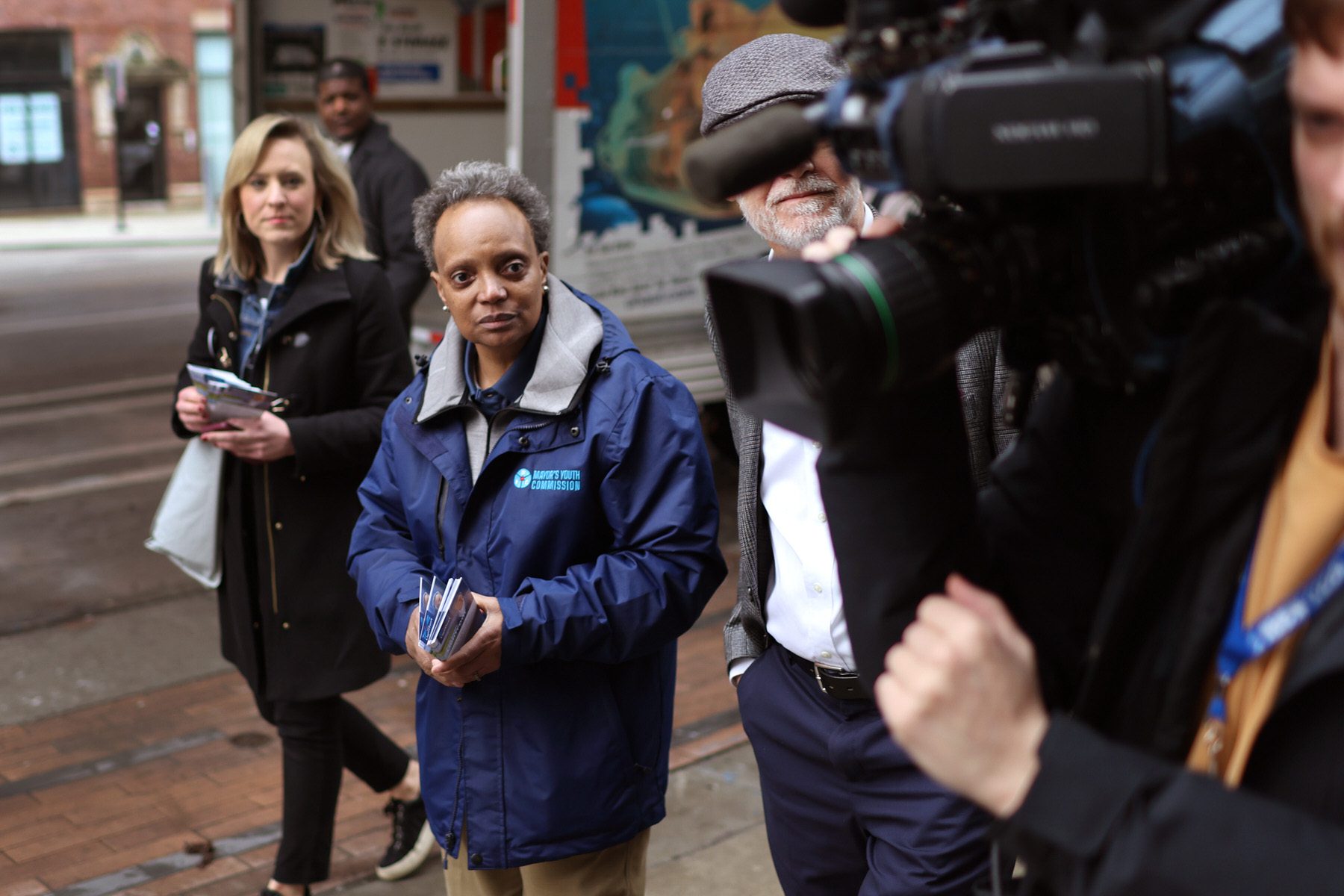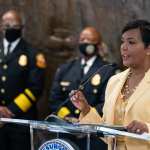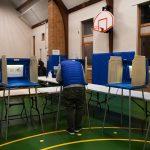Your trusted source for contextualizing politics news. Sign up for our daily newsletter.
Chicago voters rejected Mayor Lori Lightfoot’s bid for a second term, picking challengers Paul Vallas and Brandon Johnson to move on to an April 4 runoff, Decision Desk HQ projects.
Lightfoot said Tuesday night that she had called Vallas and Johnson to congratulate them.
“”We were fierce competitors in these last few months, but I will be rooting and praying for the next mayor to deliver for the people of this city for years to come,” she said.
Lightfoot was first elected to the mayor’s office in 2019, the first Black woman and out LGBTQ+ person to lead the United States’ third-largest city. She came into office as a barrier-breaker on a mission to disrupt the Chicago political machine, historically defined by an insular, old boys’ club culture and driven by political patronage.
But Lightfoot’s leadership was quickly challenged by the COVID-19 pandemic and civil unrest over police violence toward Black Americans in the summer of 2020, inflaming long-standing tensions between Chicago communities and law enforcement.
Lightfoot frequently clashed with powerful law enforcement and the Chicago Teachers Union in her first term. And her sometimes bombastic and confrontational style has alienated some of her former and would-be allies.
“I’m not a person who lives with regrets,” Lightfoot told NBC Chicago ahead of Election Day. “I certainly am not going to sit here and say we did everything perfectly. We were in the middle of a historic crisis, a worldwide crisis. There are obviously things that you’d love to do differently.”
Lightfoot also says her identities have subjected her to unfair scrutiny from critics and double standards in a city known for its tumultuous, rough-and-tumble politics. She is the first incumbent Chicago mayor to lose reelection in 40 years since Jane Byrne, the city’s first woman mayor.
“I remember Rahm Emanuel appearing on the cover of Time magazine, the headline was basically like: ‘Tough guy for Chicago,’” Lightfoot told Politico Magazine, referring to her predecessor in the mayor’s office. “No woman or woman of color is ever going to get that headline.”
Douglas Godfrey, a professor at Chicago-Kent College of Law, saw an obvious throughline from Bryne’s loss to Lightfoot’s defeat. He said that while Lightfoot “got in her way much more than she should have” at crucial points in her tenure, the voters punished her far more harshly than men who held her position known for being just as, if not more, aggressive.
“In many ways, Lori Lightfoot went out of her way to alienate people who had been supporters. But no one would accuse Rahm Emanuel or Richie Daly of being warm and cuddly guys. Rahm Emanuel, when he was in Congress, chased a guy into the bathroom screaming,” Godfrey said, referring to an alleged incident detailed by former Rep. Eric Massa. “Mayor Daley would drive down guys’ alleys and call the deputy head of city works and say, ‘This alley looks like hell.’”
Nine candidates including Lightfoot ran in the technically nonpartisan mayoral race, all but guaranteeing none would garner a majority of the vote and avoid a runoff election. Lightfoot’s main opponents were Vallas, former CEO of Chicago Public Schools; Johnson, a Cook County commissioner; and Democratic Rep. Jesús “Chuy” Garcia, who previously ran for the mayor’s office in 2015 and forced Emanuel into a runoff.
The three most recent polls before the election showed Vallas in the lead and poised to head to a runoff, with Lightfoot, Johnson and Garcia fighting it out for second place. One survey, conducted by 1983 Labs, showed Vallas beating Lightfoot by 19 points and leading all three of his main opponents in a hypothetical April 4 runoff matchup.
Lightfoot won every ward in Chicago in 2019 with a coalition of Black voters and college-educated White liberals. This year, her many challengers took different approaches in attempting to siphon off her base and lock her out of a runoff. Crime and public safety emerged as top issues in the 2023 mayor’s race, with Chicago voters pointing to gun violence and violent crime in the city as among their biggest concerns.
“Just watching the ads, you would think the entire election was about crime. And if people understand the criminal justice system, the mayor has incredibly little to do with that,” Godfrey said. “The mayors like to talk that they have something to do with that, but outside of appointing the top cop, they really have no power. The police department is its own institution.”
But when given an opportunity to express their displeasure with the state of public safety in the city at the polls, voters blamed Lightfoot.
Vallas, a former two-time candidate for statewide office, campaigned on issues of public safety and courted law enforcement support, earning endorsements from the Chicago chapter of the Fraternal Order of Police and the Chicago Tribune. Godfrey also suggested that Vallas, who came in first place, benefited from being the only White man in the race with previous name recognition as six candidates fought for votes from the Black community
Johnson, a former teachers’ union staffer from the city’s West Side, ran as a progressive to Lightfoot’s left with the backing of the American Federation of Teachers and the Chicago Teachers Union.
Garcia, another progressive who represents nearly 15 percent of the city’s population in Congress, according to Decision Desk HQ, heavily courted the Latinx voters who make up his constituency and the support of organized labor.
Lightfoot addressed young people of color and “to every kid who felt like I did when I grew up” in her concession speech, as she did in her victory speech she was elected.
“I told you back that then that anything is possible with hard work, and I want you to know that no matter what happens along the way, you should always believe that, because it’s true,” she said. “Believe that you can bring about change, believe that you matter.”






